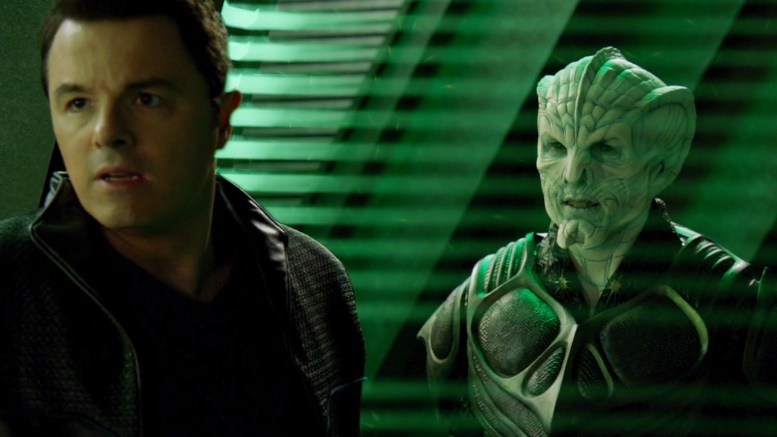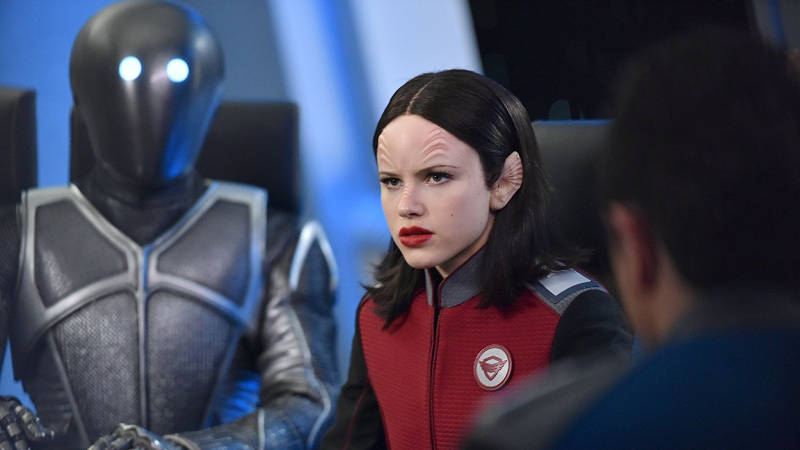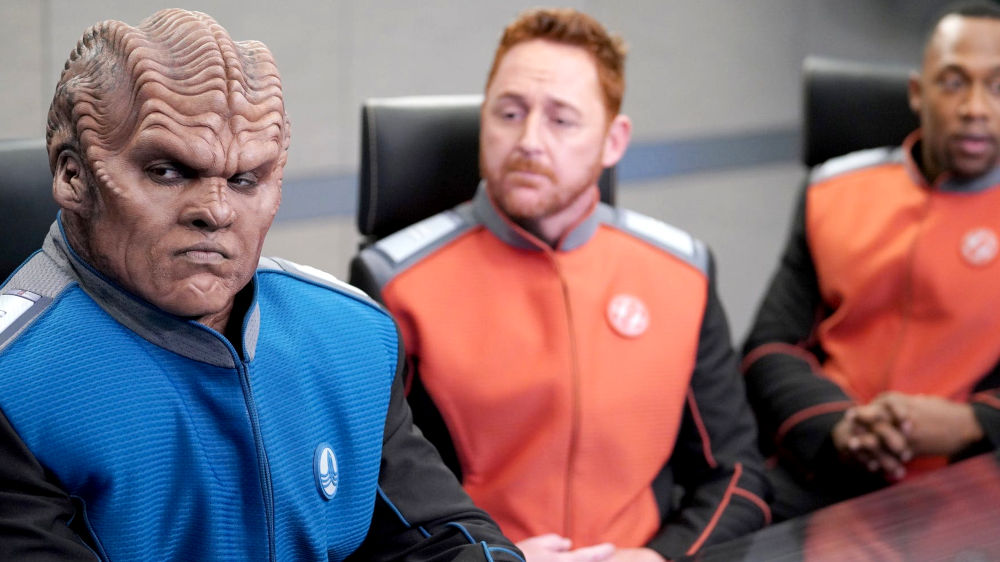Article Content
The Orville
Neither ‘Fishes’ nor fowl

The biggest problem at the core of "Nothing Left on Earth Excepting Fishes" is that I just can’t bring myself to care about Ed Mercer’s poor broken heart, and the episode really, really wants me to. The second-biggest problem is this episode recycles so many over-worn tropes that I grew restless and bored with stretches of it.
Then there’s the ending, which tries with all its might to be simultaneously offbeat and poignant (as a shuttle flies off to Billy Joel), but falls flat because such pretentions only work if there’s a workable emotional core beneath the surface. There isn’t here, so it feels like an audacious but empty artistic conceit. I’ll give Seth and his crew an A for effort, but a C for the end result.
Addressing the gravity of the situation

"Home" is an effective goodbye episode that writes out Alara Kitan in a dignified and poignant way. It might’ve worked better if she — or anyone on this series, for that matter — had been on the show longer. I’m not sure why Halston Sage is leaving the series already (there seems to be no "official" line on the matter; various rumors are out there), but the writers have given her a way to exit that fits the character as we’ve come to know her in this short time.
She’s forced to return home when Dr. Finn discovers Alara’s physical strength is diminishing because prolonged exposure to lower gravity has induced an atrophy that, if she doesn’t return home, may become permanent, making it so she can never return home. How long she will need to remain home to recover is an open question. Varied case histories suggest it could be weeks, months, or forever.
‘Primal Urges’ explores where one goes to town

"Primal Urges" is an episode in need of a good script doctor. Maybe Dr. Finn should add "script doctor" to her resume. After all, she adds "marriage counselor" to it here (where apparently an MD and a psychology PhD fall under one umbrella), in an episode that bounces around like a haphazard mess. This is an ambitious episode prone to frequent tonal and narrative whiplash, and boy does it not work.
In it, Bortus suffers from holographic porn addiction, which has negative consequences for his marriage to Klyden. Bortus lies about what he’s doing (claiming to work long hours when he’s really in the EV simulator), they haven’t had sex for a very long time, and they argue frequently in terse shouts. It’s exactly like if you took two Klingon dudes and gave them dialogue from some sort of self-help video about a failing marriage. The dialogue itself is banal and cliched; it’s the fact that it’s happening between two Moclan tough guys in Worf-like laconic deadpan that’s supposed to give it an ironic twist. That is something, I suppose. It is not enough.
‘Orville’ returns with a show about nothing

As a season premiere airing on a Sunday night right after football, “Ja’loja” plays almost like a radical act of counter-intuitiveness. The conventional thinking is to have a big or major episode as a premiere. “Ja’loja” takes the exact opposite approach. It is deliberately low in stakes, is character-driven, and is a bottle show to boot. It is a “hangout episode” where we spend time bouncing around various subplots that allow us to basically catch up with each of the regular characters. I respect the deliberate lack of ambition. I unfortunately can’t get on board with some of the actual material.
Here is the reviewing plan for 2019

The Orville returns this Sunday, followed by Discovery on Jan. 17.
The first quarter of 2019 is going to hurt me. Either that, or there will not be as many reviews as I hope there will be.
The Orville premieres this Sunday (followed by a second episode on its regular night four days later), and then Discovery starts up on Jan. 17. I was able to somehow keep the wheels on in fall 2017 and early 2018 with my schedule and turn reviews out mostly on time (within a few days of episodes airing). Whether I can do that again remains to be seen. Finding time to write is not easy. I can already say it’s not going to be as easy to do this year as it was last year. I have more going on.
So here is the plan, until such time that the plan changes, which is always a possibility. I will continue to put up weekly placeholder posts for comments (with no review) that will go up with each new airing of each episode the night it airs. I will then double back and post a review as soon as possible (hopefully within a few days) after the airing.
There’s a good chance these reviews will not be as long, detailed, or thought out this time around. Almost certainly not as long or detailed, at least. I may have to sacrifice quality and completeness for my own sanity. I hate saying that, but it may be the truth. We’ll see. I predicted that last time around and I can happily say I think the reviews turned out better than I had envisioned at the outset. Maybe that will happen again. But it very well may not, so please be forewarned. Time is the fire in which we burn. I expect to get singed pretty good in the next few months.
We’ll see how it goes…
‘Orville’ season finale: A real god complex

“Mad Idolatry” is one of the best episodes of The Orville this season, and certainly the most ambitious. It also takes me back to the very first episode to explore this series’ primary baggage, which is: This show tries very hard to be Star Trek (except populated by Average Joes), which means it sets itself up for comparisons and expectations that are among some of the best examples of televised sci-fi.
In the case of this episode, it uses TNG‘s “Who Watches the Watchers” and Voyager‘s “Blink of an Eye” as starting points to examine its own take on the hazards of cultural contamination. It’s a worthy tale that borrows aspects of classic episodes from those respective series. It thus invites the scrutiny of serious science fiction, even while employing characters that come off as amateurs. Can it survive that scrutiny?
Some characters reveal ‘New Dimensions’

"New Dimensions" is a split-tiered story chronicling a day at the office aboard a Union starship, merged with a TNG-era tech story that sets the record for technobabble on this series (although it’s certainly not record-setting when compared to TNG or Voyager). It’s like a workplace drama/comedy mixed with middlebrow sci-fi. The narrative shifts can at times be jarring, albeit not nearly as jarring as some of the early comedy/drama tonal clashes seen on this series.
Let’s start with the workplace drama, which is of considerably more consequence. Part of what this episode does is offer a take on how the workings of ship-wide personnel are conducted.
Killer clowns from outer space!

Any episode that features an establishing shot of a homicidal space clown seen way down at the end of the hallway in a stylistic homage to The Shining — followed by that clown charging full-tilt toward the protagonist — can’t be all bad.
The shot gets your attention, that’s for sure. It’s laughably weird and head-scratchingly bizarre, but it tells you we are in strange territory. It happens because, as we eventually learn, anything here can happen. It’s a strange moment that threatens to bring down "Firestorm" before the story has even had a chance to take off. But you know what? I remember that shot more than anything else. It stands out.
Ed and Kelly are feeling awfully blue

The title for "Cupid’s Dagger" tells you a good deal of what you need to know about this episode. It’s in a long tradition of farcical comedies about people falling in love for reasons outside of their control, leading to broad silliness and embarrassment. Usually the question for a show like this is: Did I laugh or did I cringe? Maybe both?
Indeed, I saw this plot just earlier this year with Grimm‘s "Blind Love," which was a fun example of good-natured silliness as a humorous detour. It made me laugh, especially when a character fell in love with himself and sang into a mirror. That was a good twist. On the other hand, the cringe example that always immediately springs to mind is DS9‘s "Fascination," which was just an awful collision of characters rushing to the front of the line to embarrass themselves.
Orville’s ‘Into the Fold’ crashes and burns

It seems fitting that the first script credited to Voyager alums Brannon Braga and Andre Bormanis involves a Shuttle Crash [TM]. It’s a shuttle crash that, from the looks of it, should’ve left everyone aboard, with the possible exception of Isaac, quite dead. The tail end of the shuttle even breaks off, like the plane in Lost. This leaves our crash survivors separated from each other.
Specifically, this leaves Dr. Claire Finn separated from her two young sons (we learn here that she’s a single mother by choice), who are protected by Isaac, who must play the role of Dad to the two kids, Marcus and Ty (BJ Tanner and Kai Di’Nilo Wener), who — let’s be honest — are pretty damn annoying. (Yes, kids can be annoying. I know this. I have two of them. That doesn’t make it easier to watch annoying kids on TV.)
